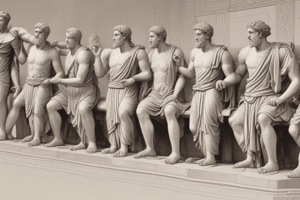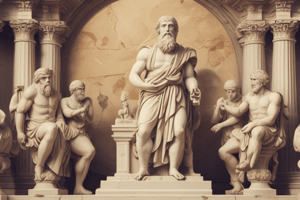Podcast
Questions and Answers
Which process involves water vapor turning into liquid water during the water cycle?
Which process involves water vapor turning into liquid water during the water cycle?
- Collection
- Precipitation
- Evaporation
- Condensation (correct)
What distinguishes cultures from one another?
What distinguishes cultures from one another?
- Cultural variations (correct)
- The availability of fresh water
- Economic resources
- Biological differences
Which branch of anthropology focuses on human evolution and biological diversity?
Which branch of anthropology focuses on human evolution and biological diversity?
- Cultural Anthropology
- Ethnology
- Linguistics
- Physical/Biological Anthropology (correct)
What term describes the intangible aspects of culture such as language and ideas?
What term describes the intangible aspects of culture such as language and ideas?
Which type of government is characterized by public ownership of property and resources?
Which type of government is characterized by public ownership of property and resources?
What is defined as social standing based on education, income, and occupation?
What is defined as social standing based on education, income, and occupation?
Which term refers to the societal expectations placed on individuals based on their sex?
Which term refers to the societal expectations placed on individuals based on their sex?
Which branch of political science focuses on governance and power in society?
Which branch of political science focuses on governance and power in society?
What is one positive effect of religion on society?
What is one positive effect of religion on society?
Which of the following is a negative effect associated with religion?
Which of the following is a negative effect associated with religion?
What is the purpose of a KWLH Chart in the context of reading?
What is the purpose of a KWLH Chart in the context of reading?
Which graphic organizer is best suited for analyzing relationships between different concepts?
Which graphic organizer is best suited for analyzing relationships between different concepts?
What does 'formal schema' primarily refer to in the context of reading?
What does 'formal schema' primarily refer to in the context of reading?
What event is associated with the practice of self-immolation as a form of protest?
What event is associated with the practice of self-immolation as a form of protest?
Which schema helps readers relate new information to their existing knowledge?
Which schema helps readers relate new information to their existing knowledge?
What might result from rigid social norms perpetuated by religion?
What might result from rigid social norms perpetuated by religion?
What does the Greek word philosophia translate to in English?
What does the Greek word philosophia translate to in English?
Which philosopher believed that air is the fundamental element of the universe?
Which philosopher believed that air is the fundamental element of the universe?
What is the primary focus of Socrates' philosophy?
What is the primary focus of Socrates' philosophy?
In the context of philosophical reflection, what does it primarily examine?
In the context of philosophical reflection, what does it primarily examine?
What concept did Parmenides emphasize in his philosophy?
What concept did Parmenides emphasize in his philosophy?
Which medieval philosopher sought to combine faith with reason?
Which medieval philosopher sought to combine faith with reason?
What system of philosophy explains Christian doctrines using logical reasoning?
What system of philosophy explains Christian doctrines using logical reasoning?
Which of the following best describes Humanism during the Renaissance?
Which of the following best describes Humanism during the Renaissance?
What discovery did Edwin Hubble make regarding nebulae?
What discovery did Edwin Hubble make regarding nebulae?
Which hypothesis suggests that the Sun formed from a rotating gas cloud?
Which hypothesis suggests that the Sun formed from a rotating gas cloud?
What characterizes the inner terrestrial planets compared to the outer gaseous planets?
What characterizes the inner terrestrial planets compared to the outer gaseous planets?
Which layer of Earth is composed mainly of iron and nickel?
Which layer of Earth is composed mainly of iron and nickel?
What is the primary gas composition of Earth's atmosphere?
What is the primary gas composition of Earth's atmosphere?
Which layer of Earth is the zone of life?
Which layer of Earth is the zone of life?
What significant role does the ozone layer in the stratosphere serve?
What significant role does the ozone layer in the stratosphere serve?
What is the coldest layer of Earth's atmosphere?
What is the coldest layer of Earth's atmosphere?
Which reading strategy involves creating high-level questions before, during, and after reading?
Which reading strategy involves creating high-level questions before, during, and after reading?
What is a key characteristic of online reading materials compared to offline materials?
What is a key characteristic of online reading materials compared to offline materials?
Which of the following best describes 'Metacognition'?
Which of the following best describes 'Metacognition'?
What does the classification strategy do?
What does the classification strategy do?
Which aspect of electronic texts allows users to navigate through content in a flexible manner?
Which aspect of electronic texts allows users to navigate through content in a flexible manner?
What is a primary feature that distinguishes online reading from offline reading?
What is a primary feature that distinguishes online reading from offline reading?
During which phase of reading would a reader typically summarize and reflect on the content?
During which phase of reading would a reader typically summarize and reflect on the content?
Which domain is considered a trustworthy source for academic information?
Which domain is considered a trustworthy source for academic information?
Flashcards are hidden until you start studying
Study Notes
History of Philosophy
- Originates from the Greek philosophia, translating to "love of wisdom."
- Derived from Sofia (wisdom) and Philo (love).
Ancient Philosophy
- Pre-Socratics: Early thinkers exploring cosmology and metaphysics.
- Anaximander introduced the concept of apeiron (indefinite).
- Anaximenes identified air as the fundamental element.
- Heraclitus posited that everything is in constant change.
- Parmenides argued that nothing changes; everything is eternal.
- Pythagoras emphasized the significance of numbers and the immortality of the soul.
Sophists & Socratics
- Sophists: Traveling educators stressing human-centered philosophy.
- Protagoras claimed, "Man is the measure of all things."
- Socrates: Advocated for self-knowledge and the care of the soul.
Plato & Aristotle
- Plato: Advocated for the harmony between body and soul for true happiness.
- Aristotle: Viewed humans as rational beings, defining the soul as the body's form.
Understanding Reality
- Philosophical Reflection: Addressing existential issues in life.
- Philosophical vs. Scientific Questions: Philosophical queries explore totality, while scientific questions focus on specifics.
- Dialectics: A method involving thesis, antithesis, and synthesis to discern truth from opinion.
Medieval Philosophy
- Scholasticism: Merging faith and reason to elucidate Christian doctrines.
- St. Anselm emphasized divine understanding through reason.
- St. Augustine explored body-soul relationships.
- St. Thomas Aquinas integrated Aristotelianism with Christian theology.
- Key Concepts: Substance vs. accidents, matter vs. form understanding.
Modern Philosophy
- Renaissance & Humanism: Shift towards human essence and nature.
- Key figures included Francesco Petrarca and Niccolo Machiavelli, with a focus on self-freedom and political realism.
- Rationalism: Prioritization of reason and rational thought.
Astronomy
- Edwin Hubble: Discovered that nebulae were galaxies, providing evidence for the universe's expansion.
- Hubble Space Telescope: Facilitated advanced astronomical insights since 1990.
Solar System
- Nebular Hypothesis: Proposes a rotating gas cloud led to sun and planet formation.
- Encounter Hypothesis: A rogue star's pass caused gas to fragment into planets.
- Protoplanet Hypothesis: A gas and dust cloud condensed into celestial bodies approximately 4.6 billion years ago.
Earth's Subsystems and Layers
-
Subsystems:
- Atmosphere: Composed of 78% nitrogen and 21% oxygen.
- Hydrosphere: Covers 71% of Earth, with majority being saltwater.
- Lithosphere: The rigid rocky outer layer.
- Biosphere: Zone of life including all organisms.
-
Layers of Earth:
- Crust: Outermost layer, 1% of Earth's volume with oceanic (basalt) and continental (granitic) components.
- Mantle: Silicate-based, making up 84% of Earth's total volume.
- Outer Core: Liquid layer primarily of iron and nickel.
- Inner Core: Solid center, responsible for Earth's magnetic field.
Earth’s Atmosphere and Its Layers
- Troposphere: Contains most weather and 75-80% of atmosphere’s mass.
- Stratosphere: Houses the ozone layer for UV protection.
- Mesosphere: Coldest layer, protects Earth by destroying meteors.
- Thermosphere: Notable for photochemical activity and auroras.
- Exosphere: Fades into outer space.
Hydrosphere and Water Cycle
- The water cycle includes processes of evaporation, condensation, and precipitation.
- Freshwater resources encompass ice sheets, glaciers, and aquifers.
Biosphere and Life on Earth
- Includes all organisms and undecomposed organic matter, classified into kingdoms based on differences.
Understanding Culture, Society, and Politics
- Culture: Encompasses knowledge, beliefs, arts, and customs.
- Material Culture: Tangible objects.
- Non-Material Culture: Intangible aspects like ideas and behavior.
- Social Constructs:
- Gender: Societal roles based on sex.
- Socio-Economic Class: Determined by education and income.
- Ethnicity and Race: Defined by shared culture or physical traits.
- Political Systems:
- Democracy: Power shared by the populace.
- Monarchy: Power held by a single ruler.
- Dictatorship: Sole control by an individual.
- Communist State: Public ownership of resources.
- Theocracy: Governance by religious leaders.
Studying Anthropology, Political Science, and Sociology
- Sociology: Focuses on social interactions and structures.
- Anthropology: Studies humanity's development and culture.
- Branches include Physical Anthropology, Archaeology, Linguistics, Ethnology, Cultural Anthropology.
- Political Science: Analyzes politics and power dynamics.
Positive and Negative Effects of Religion
- Positive: Promotes moral values and social harmony.
- Negative: Can lead to discrimination and conflict.
Historical Events Influenced by Religion
- Self-immolation of Buddhist monks as protest.
- Sati practice in India.
- The Inquisition marked religious persecution in medieval Europe.
Reading and Writing Skills Review
- Content Schema: Aids in comprehension; includes knowledge on topic and language.
- Schemata: Frameworks guiding understanding of new material based on previous experiences.
- Graphic Organizers: Visual tools for concept relationships, promoting comprehension.
Understanding Formal and Linguistic Schemata
- Formal Schema: Knowledge of text structures (e.g., narration, classification).
- Linguistic Schema: Involves vocabulary, grammar, and idioms.
Metacognitive Strategies in Reading
- Strategies: Includes making connections, questioning, monitoring understanding, and synthesizing information.
Online vs. Offline Reading
- Online is interactive with multimedia and easily updated, while offline materials are static and subject to wear.
Electronic Texts
- Defined as any digitally stored and accessed texts, offering non-linear reading and interactive features.
Studying That Suits You
Use AI to generate personalized quizzes and flashcards to suit your learning preferences.





